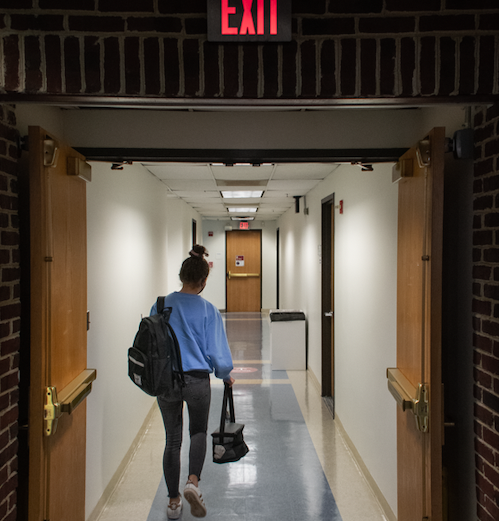Since hybrid learning commenced on Oct 5, only a single COVID case among students and faculty had been confirmed before mid-March. Two cases in the senior class and two cases in other grades challenged the notion of WIS’s safety within a week. As WIS has grown used to the hybrid system, students, faculty and administrators alike have become too comfortable regarding COVID restrictions.
Accountability:
One important aspect of COVID safety is accountability, and it is the hardest to achieve. WIS students do not always adhere to social distancing regulations. Several of the other measures are also ineffective because students are not held accountable. After flex periods, many students fail to clean their desks, remarking that “we all tested negative.” Despite the fact that testing may come back negative, it is important to continue to follow regulations even if the odds of catching COVID is more unlikely.
Around campus, it is not a surprise that students often come close to each other. It is the responsibility of the student body to ensure that everyone is being as safe as possible at school. Some of WIS’s spaces make it incredibly difficult to do that, like hallways and mansion classrooms. Even so, there are times where students are blatantly right next to each other, and a faculty member walks by and says nothing.
Students should be able to hold themselves accountable, but it seems impossible given the interactions students have on campus. In order to make up for students being too close to each other, it has become the duty of faculty to ensure students are socially distant, and it is not happening. It is incredibly important for the safety of the WIS community that faculty members keep students apart, and WIS should focus on faculty mitigating in-school student mingling.
Unfortunately, outside of school, there is no way to enforce students to interact solely within their cohort. Therefore, it is incredibly important to maintain simple measures like hand washing, social distancing and desk cleaning in order to never feel too comfortable especially as WIS is seeing cases emerge that are some of the only cases of this year.
However, some students are acting to maintain WIS safety after possible exposure from sophomore and senior cases. Upper School principal’s, Sarah Polland’s, email on March 23 noted that, “Given the number of Red Cohort Grade 10 students who are not on campus today, it seems students who believe they may have had some exposure are making the wise decision to limit their contact with other individuals. Thank you for considering your peers and the WIS community as a whole.”
Smaller numbers of students on campus following these cases is indicative that students are being weary of COVID. Some students may be holding themselves accountable while others may be worried about catching the virus.
Testing:
An important reason for WIS’s false sense of security is how tests have been administered since COVID testing first began. When WIS first started testing, students would be chaperoned by an administrator going from their classroom, and test administrators would pay close attention to students testing themselves.
WIS allowed students in each grade to come to the testing location at their time. “We no longer have runners come to get students from class. Please be sure you know when you are assigned to go for your Covid test,” AP Allison Ewing’s weekly email to upper schoolers states.
The choice to eradicate runners has been a huge mistake. Testing is one of the most important parts of WIS safety precautions, and it is not being treated as such. For one, all students in one grade are in the same place at once, so social distancing becomes virtually impossible and crowding routinely happens. Therefore, students sometimes even take their tests without masks facing groups of students.
The space becomes overly crowded, and teachers helping run the testing program do not pay attention to the students taking the tests which makes it incredibly difficult to ensure that students are administering the test properly. It is a failing of WIS safety to place such disregard to something we are lucky to be receiving that ensures our safety.
Recent COVID Cases:
Recently, positive tests, not discovered through the WIS testing program, have arisen and created a shockwave through the community. Of course positive cases should not be normalized, but the pure shock and hysteria I have encountered from my peers indicates that, as a student body, we have let our guard down. Reading through my class of 2022 grade group chat brought me a lot of stress hearing others be hysterical about these cases. This anxiety shows that students have let their guard down. Being stressed about COVID is one thing, but being surprised that some community members could contract the virus signifies that we have grown far too comfortable.
Despite stress around cases, I hear about the next step students have taken to break COVID guidelines like dining indoors or hanging out in bigger gatherings sometimes with students outside of school. Many students disregard the safety that WIS tries to maintain on campus. At this point, cases do not shock me.
Despite my lack of shock, it is difficult to have continued safety when people are blatantly disregarding school regulations like cohort mixing and maskless gatherings. Students have become way too comfortable with acting selfishly while continuing to return to school, putting others in danger. I found many of these students were stressed about COVID while at school, but disobeyed precautions in every other aspect of life. The actions of those around me demonstrate a complete negligence for the safety of WIS and adds a blanket of false comfort covering the WIS student body.
Positives:
Even though WIS has become too comfortable, the administration has communicated effectively about the cases, allowing students to come to a decision about coming to school and their own safety.
Despite it being difficult to control students, Polland reaffirmed regulations in her email about WIS COVID regulations. “Yes, seeing friends is important, as is engaging in non-academic endeavors. But please consider your choices carefully and continue with the COVID mitigation measures that have kept our school community relatively healthy over these past months,” Polland wrote.
Like Polland notes, WIS mitigation strategies have been an effective way to prevent spread on campus. The small spread of cases in late March did not stem from any campus exposure and was primarily on campus. Therefore, the regulations must be taken seriously.
Conclusion:
Overall, WIS has become too comfortable in dealing with these measures as the community has grown accustomed to the hybrid model. It is imperative that some of these measures either be reinstalled or heightened in order to maintain safety for everyone that comes in contact with the WIS community. COVID has been an issue through hybrid, we have simply become desensitized to it. For this reason, the WIS community needs to act more safely and add more concrete restrictions to ensure the safety of community members. However, the scope of recent cases and effectiveness of safety measures in mitigating the spread of COVID is still unknown.






































































